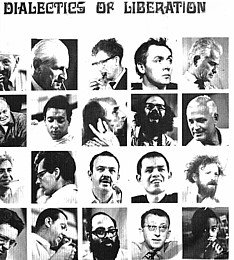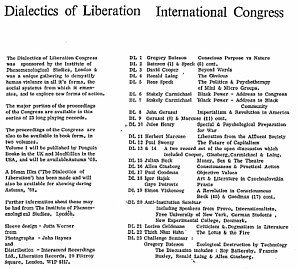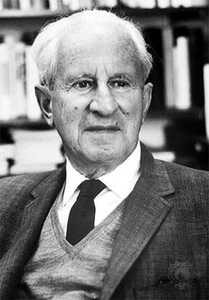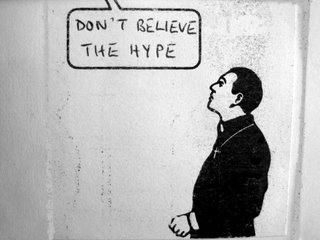Ludwig Wittgenstein and Latin American dance are rarely written about in the same blog, but hey – this is Homo Ludens, and we do things a little differently here.
Last Friday, I went to
Fuerzabruta at the refurbished
Roundhouse in Chalk Farm. “Fuerzabruta” is Spanish for “brute force,” which perhaps hints that this was not yr common-or-garden soar ‘n’ sashay affair. I can take or leave contemporary dance, but the company’s blurb said that it was “An event where worlds collide. A powerful music score, strobe lighting, nudity (moderate), water (lots), scenes of a poetic, violent and beautiful nature and a whole lot of mess. It's an all-standing rave of a show.” I’m sure they’re right, and I’m not saying I didn’t enjoy it. But still – dance is not my medium, so I took it and left.
As I walked out of the auditorium, a display caught my eye. It described a conference, held in an earlier version of the Roundhouse in 1967, entitled “
The Congress on the Dialectics of Liberation” (more
here). Organised by anti-psychiatrist R.D.Laing, its keynote speakers were Herbert Marcuse, Stokeley Carmichael and Allen Ginsberg. It is a sign of our contemporary passivity that one finds it difficult to imagine what a radical intellectual event with such disparate voices might look like today – such public intellectuals and artists are hard to find.

 AN LP WAS MADE OF THE CONGRESS IN QUESTION - HERE ARE THE FRONT AND BACK SLEEVES. NO COVER VERSIONS ARE KNOWN TO THE PRESENT WRITER...
AN LP WAS MADE OF THE CONGRESS IN QUESTION - HERE ARE THE FRONT AND BACK SLEEVES. NO COVER VERSIONS ARE KNOWN TO THE PRESENT WRITER...For all its claims of creating the Anti-university of London, I don’t doubt that the Congress made little actual progress. Yet the conclusions that Congress came to fit our modern-day situation rather well. In the introduction to the book The Dialectics of Liberation, psychiatrist David Cooper explains how psychiatric research had helped to inform the political climate of the day, dominated as it was by the USA’s impact on the world, and specifically the American War in Vietnam:
“Our experience originated in studies into that predominant form of socially stigmatized madness that is called schizophrenia. Most people who are called mad and who are socially victimized by virtue of that attribution (by being ‘put away’, being subjected to electric shocks, tranquillizing drugs, and brain-slicing operations, and so on) come from family situations in which there is a desperate need to find some scapegoat, someone who will consent at a certain point of intensity in the whole transaction of the family group to take on the disturbance of each of the others and, in some sense, suffer for them.”The anti-psychiatry movement explored whether schizophrenics were a priori mad, or whether their symptoms were merely an absorption of the anomalies and abnormalities of the world. Is madness, they asked, merely the point where “sanity” fails in an irrational, insane world? Does modern society require people to take on the mantle of madness in order to convince itself that it is otherwise sane? Put another way, do we purge ourselves of sociopathic psychoses by projecting them onto other people?
The same argument has been used by Zizek to describe the unique form of Western racism towards the Balkans, whereby that area enables “civilised,” “enlightened” Europeans to project their latent and untamed monstrousness onto a nearby “Other.” As soon as the Other takes on the status of enemy or victim, it becomes dehumanised. This, Cooper says, is what was happening in Vietnam as the Congress in Chalk Farm was underway; and it is happening all over again in the Middle East:
“The ‘inhuman’ become ‘non-human’. At this point they become the ultimate projected versions of ourselves, those bits of ourselves that we wish most finally to destroy in order to become Pure Being. If we cannot destroy these bits in ourselves, we have to destroy them in this outside version.”

This is a straightforward psychoanalytical point, but it provides an interesting skew on the Hegelian absolute being, or indeed any synthesis that results from a dialectical process. It suggests that any conflict between a force and its opposite will leave a surplus which is not taken up by the synthesis. So, to use the Marxist example, when the forces of production clash with those who own the means of production, neither will be absolutely annihilated. Socialism may win the struggle, but there will be aspects of capitalism (and not just those which are intended) which will remain.
Nevertheless, to go back to the dehumanisation of the Other, this reduction of on the one hand the civilised West, and on the other the uncivilised East, into pure, abstract signifiers rules out the possibility of reflection. We dispense with, as
Blair did in his American speech this week , any analysis of cause and effect, of the effect of history upon a situation. Hezbollah become terrorists; Israel is fighting for its survival. End of story.
*
You can read Marcuse’s address to the 1967 Congress
here. One wonders how Marcuse went down with the hippie crowd of the time. Perhaps rather well: despite counselling his audience that his speech would be that of “a hopeless philosopher,” it is full of utopia (listen to
this for proof). I didn’t think all that much of it, to be honest, and would rather look at Marcuse’s explanation as to why contemporary debate might be so crude. Chapter 7 of his classic One Dimensional Man (damningly entitled “The Triumph of Positivist Thinking: One Dimensional Philosophy”) looks specifically at positivism.
The positivist school of philosophy, whose leading proponents included Wittgenstein, Popper and Russell (each, ironically, offering rather different versions of a system which is supposed to do away with ambiguity), rests on the principle that we should speak only of what we know. It states that there is a logic to language, and that as long as we follow this logic, we can organise statements into meaningful ones and those which make no sense. Wittgenstein’s Tractatus Logico-Philosophicus is, perhaps, the cornerstone of positivist thinking. Its famous seventh proposition states: “What we cannot speak about we must pass over in silence.” Proposition 4.5 states: “The general form of a proposition is: This is how things stand.”


I can see how this sort of thing appeals to people. It is basically philosophy for people who don’t like philosophy, or rather who do not like manageable dictums being spoiled by the messy business of real life. It also absolutely precludes any subjective position, and yet it promotes solipsism. It is also timeless, and I do not mean that as a tribute. Wittgenstein’s word games, whereby he experiments with statements made by and to abstract beings (“Person A” and “Person B”), would have been as logical two thousand years ago as they are today, because the speakers and the statements they make are plucked from a fabricated reality. Their irreality means that positivism strays dangerously close to metaphysics, the one doctrine it is supposed to do away with.
Marcuse’s criticism of Wittgenstein is nicely summed up in his conclusion to Chapter 7:
“In spite of the simple clarity [of the language game], the speakers and their situation remain unidentified. They are x and y, no matter how chummily they talk. But in the real universe of discourse, x and y are “ghosts.” They don’t exist; they are the product of the analytic philosopher. To be sure, the talk of x and y is perfectly understandable, and the linguistic analyst appeals righteously to the normal understanding of ordinary people. But in reality, we understand each other only through whole areas of misunderstanding and contradiction.”It is not enough to say that meaning is sufficiently stable that we can understand each other most of the time. It is true that we share enough of a comprehension of language to communicate fairly well with each other. But Wittgenstein’s conception of philosophy relies on the fixity of language, and does not allow for this constancy to be broken up by the peculiarities of individual subjects. “Language sets everyone the same traps; it is an immense network of easily accessible wrong turnings,” Wittgenstein says. “What I have to do then is erect signposts at all the junctions where there are wrong turnings show so as to help people past the danger points.” Wittgenstein acknowledges the impossibility of his task, and concludes that, since it cannot serve his purpose, philosophy can teach us little that is new. It certainly cannot offer up any grand theories. It should suffice us to expect from it no more than a reflection of reality.
Such is the limited scope of positivism. It is delineated by straightforward empiricism, with material science (very different to social materialism) as its primary referent. As such, it precludes any thought that steps outside already accumulated knowledge and, more importantly, precludes any thought or communication that does not originate from the conscious. “It leaves the established reality untouched; it abhors transgression.”
In Philosophical Investigations, Wittgenstein says “For a large class of cases – though not for all – in which we employ the word “meaning” it can be defined thus: the meaning of a word is its use in the language.” So to understand a word, it helps to know the specific object or concept to which it is referring at that moment, whether the word is formal or colloquial, if there are special circumstances where that word is usually employed etc. But Wittgenstein’s analysis only holds water when applied to his manmade situations and characters. It overlooks how meaning is shaped by methods of communication other than direct speech.
The incapacity of language to speak for us (exemplified by the fact that our thoughts, conscious and unconscious, cannot all be articulated) creates a profound alienation. In a romantic situation, this may have two consequences. The first is the classic “How much do you love me?” situation, whereby you are persuaded to quantify your love in words. I have written about this
elsewhere. The second, the albatross of courting couples, is the misinterpreted statement. If a new girlfriend tells me that her ex-boyfriend bought her lots of gifts, but that she eventually got bored with him and dumped him, should I infer that (a) I should buy her lots of gifts in order to further progress our relationship, (b) I should not buy her gifts because she easily tires of such trifles, or (c) it does not matter either way, since she is still talking about her ex and is therefore still in love with him? Whichever I choose, it is probably not the one she intended, if indeed she intended any hidden meaning at all.
*
Applied to a capitalist society, where language and meaning is warped and cajoled, positivist analysis seems both naïve and conformist. As Marcuse says, its “acceptance of the empirical violates the empirical, for in it speaks the mutilated, “abstract” individual who experiences (and expresses) only that which is
given to him who has only the facts and not the factors, whose behaviour is one-dimensional and manipulated.” Minifig, who I know would name Wittgenstein as the philosopher who for him has best explained the world, exemplifies the problem of positivism in his
critique of religion. There is little here that I actively disagree with, but crucially there is so much that it
doesn’t say. It does not mention why religions are formed, why people find religion comforting or empowering or uplifting or provocative, and it does not once mention history, class etc. In other words, it does not mention
people, nor the contradictions and conflicts that determine their lives and shape historical change.
For all its embarrassment with the business of philosophy, positivism is too formal for its own good. It is the reason why Julian Baggini asks
if we should eat the pig that wants to be eaten. Find me a pig that wants to end up in my bacon roll, get to the bottom of his historical, and then
maybe – just maybe – I might give you an audience.















